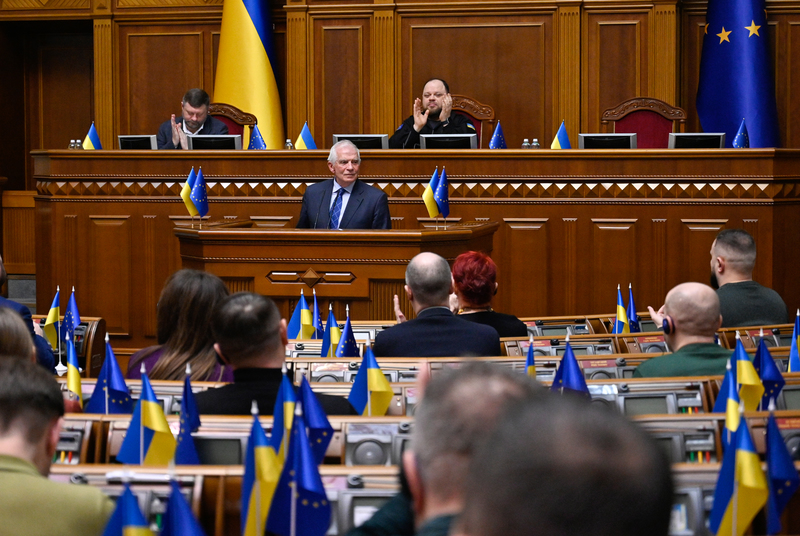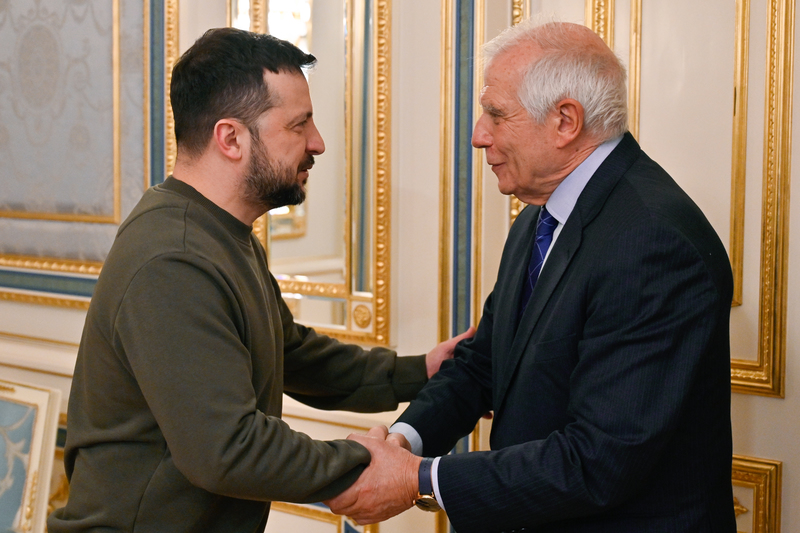EU’s High Representative for Foreign Affairs and Security Policy, Josep Borrell, visited Kyiv last week where he expressed the EU’s strong support for Ukraine and denounced Kremlin’s disinformation campaign.
This was his fourth visit to Ukraine since Russia started its full-scale invasion and his sixth visit since he became High Representative. During the visit he met the Ukrainian President, Volodomyr Zelenskyj, and his ministers. He also delivered a landmark speech at the Ukrainian parliament (Verkhovna Rada).
“There is nothing more important than to support you because the war also affects directly EU’s security,” he said. “You have to win the war and you have to win the peace. And the best way of winning both is your way to the EU. Ukraine and your EU membership remains a top priority for the EU.”
EU will support Ukraine along the way but there are no shortcuts. Ukraine, as any other candidate country, will have to implement and enforce the acquis (EU law), he said, and took Ukraine to task on the issue of corruption. The latest development has been positive but more has to be done. “Corruption undermines significantly the efficiency of the war effort.”
Borrell’s visited coincided with media reports about American journalist Tucker Carlson’s two-hour interview with Russian president Putin. The interview was published on social media on Thursday evening after Borrell’s visit. In his speech to the Ukrainian parliament, the High Representative rebutted Kremlin’s allegations as disinformation and fake news.
The Russian president believes that Russia has a historic claim to Ukraine or parts of its territory. He used the first half hour of the interview to repeat his claims in an essay he wrote in July 2021 before the war (‘On the Historical Unity of Russians and Ukrainians’).
He continues to claim that the goals of the invasion of Ukraine was to prevent the country from threatening Russia by joining the NATO. Russia’s goal is still to “de-nazify” Ukraine. He claimed that Russia has never refused negotiations and it is the Ukrainian leadership who should stop the war. If the West wants to end the war, it should stop supplying Ukraine weapons, he said.
War of attrition
Russia may want to end the war as soon as possible but only on its own terms, Borrell said. “And what are the terms? Denazification, demilitarisation, and dismantling. These three ‘De’s are Putin’s recipe for Ukraine. And these words mean only one thing: surrender.” Ukraine’s Peace Formula is the only comprehensive framework for a just and sustainable peace, Borrell underlined.
The war has become of war of attrition where Russia counts on its military resources in firepower and manpower and waits for the re-election of Trump in the US. Despite Ukraine’s failed counter-offensive Borrell sounded optimistic about Ukraine’s victory. “Russia has achieved virtually no progress on the battlefield in 2023,” he said.
“We need to challenge the claims that Ukraine cannot win. I hear this message from defeatism. ‘Why are you continuing supporting Ukraine if Ukraine cannot win?’ That is not true. Russia has lost many wars in its history.” The EU sanctions have also taken a heavy toll on Russia’s economy despite their circumvention.
“It’s a very difficult process, but we see that it works slowly but surely.” Borrell claimed that the EU has finished its energy dependency with Russia. The latest figures given by a Commission spokesperson on Friday show that the EU’s import of natural gas from Russia has been reduced significantly but that it still accounted for 15 % of EU’s gas imports in 2023.
Borrell admitted that the EU has not been able to deliver enough ammunition to Ukraine in time. “I have been talking with your military staff, and I know that you need more,” he said. Judging by his figures, the EU has supplied ca 525.000 rounds of ammunition until now, far below the target of 1 million.
However, EU’s defense industry has increased its capacity. By the end of 2024, the total amount of ammunition delivered as donations will be about 1.155 million, which is quite a “precise figure”, according to Borrell. Besides donations, EU countries can also supply an “equal” amount of ammunition by exporting them through direct contracts. Figures about them are not disclosed.

High Representative Josep Borrell in the Ukrainian parliament, credit: EU
War of annihilation
From the very start of Russia’s invasion, the EU described it an unprovoked, illegal attack and a war of aggression against Ukraine. In his speech, Borrell called it for the first time a war of annihilation, aimed at not only abolishing Ukraine’s independence and territorial integrity but also at destroying Ukraine as a nation.
This might indicate “genocidal intent” by Russia but no EU member has yet brought the case to the International Court of Justice (ICJ). The EU itself is not a party to the genocide convention and cannot initiate any proceedings.
In a recent ruling by the court on the application of the genocide convention, filed by Ukraine against Russia, the court concluded that Ukraine’s submission was admissible. The case, which was filed directly after Russia’s invasion, dealt with Russia’s allegation that Ukraine was responsible for committing genocide in the two breakaway republics in Donbas.
However, the Court did not find that it has jurisdiction to judge whether Russia’s invasion violated the genocide convention.
Countering Russia’s information manipulation, Borrell said that, “We must show for what it is: Russia is the last colonial empire in Europe.” This war is not a matter of the West against the rest of the world. People in the “South” of the world, with a history of Western colonialism, have to understand the root causes of this war.
“However, paradoxically, many do not see Russia as an imperialist and colonialist power at all…. Russia remains an imperialist power that is unable to disentangle itself from a colonial vision of its identity. Until this question of Russia's identity will not be solved, it will remain a threat to all its neighbors in Europe.”
M. Apelblat
The Brussels Times

